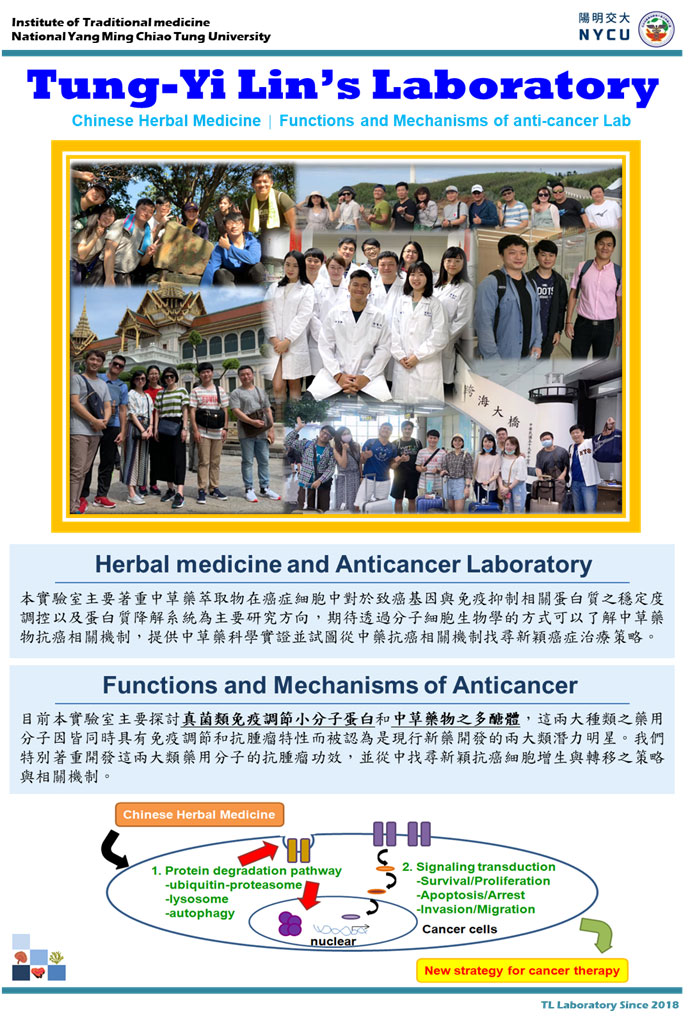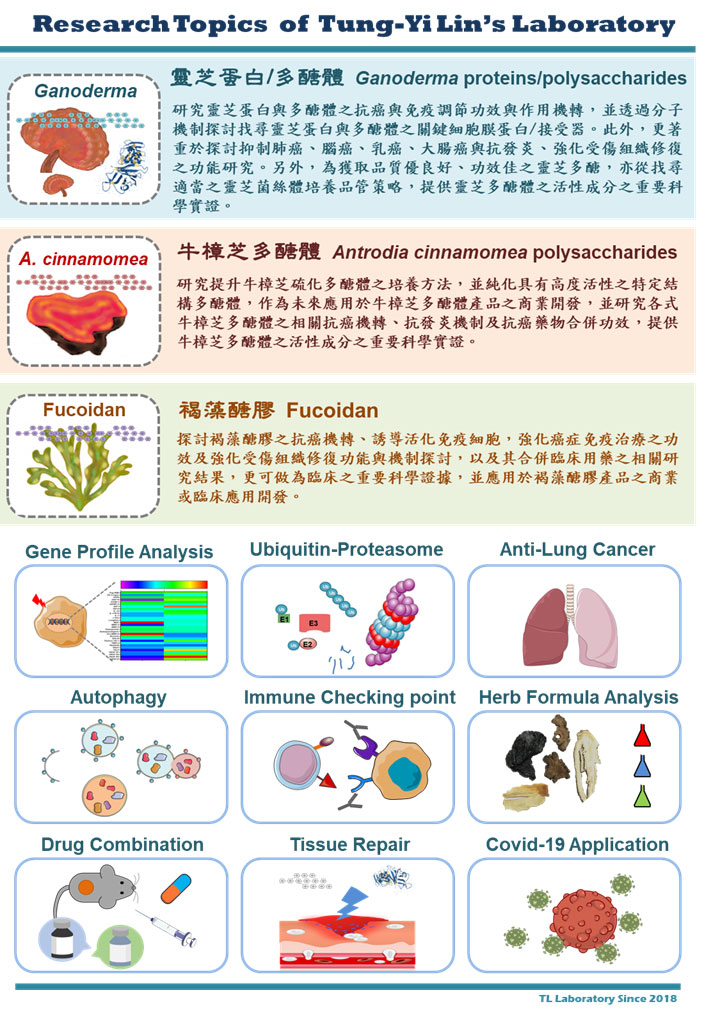經 歷
2024-迄今 國立陽明交通大學傳統醫藥研究所 教授
2024-迄今 國立陽明交通大學中醫學系 教授兼副系主任
2024-迄今 國立陽明交通大學生技醫療產業博士學位學程 教授
2024-迄今 國立陽明交通大學分子醫學博士學位學程 教授
2021-2024 國立陽明交通大學傳統醫藥研究所 副教授
2021-2024 國立陽明交通大學生技醫療產業博士學位學程 副教授
2021-2024 國立陽明交通大學分子醫學博士學位學程 副教授
2020-2021 國立陽明大學生技醫療產業博士學位學程 助理教授
2019-2021 國立陽明大學分子醫學博士學位學程 助理教授
2018-2021 國立陽明大學傳統醫藥研究所 助理教授
2017-2018 衛生福利部國家中醫藥研究所 博士後研究員
學 歷
國立陽明大學暨中央研究院 分子醫學博士學位學程
National Yang-Ming University and Academia Sinica, Taipei, Taiwan.
Program in Molecular Medicine (Ph.D.)
國立陽明大學 醫學生物暨檢驗學系碩士班
National Yang-Ming University, Taipei, Taiwan.
Department of Biotechnology and Laboratory Science in Medicine (Master)
國立臺南大學 生物科技學系
National University of Tainan, Tainan, Taiwan.
Department of Biological Sciences and Technology (Bachelor)
學術獎項
01. 2023年美國AII達文西國際發明展獎暨發明競賽-金牌獎
02. 2023年韓國WiC世界創新發明大賽-金牌獎
03. 2023年韓國WiC世界創新發明大賽-大會特別獎
04. 2023年第19屆榮總台灣聯合大學合作研究計畫優良論文獎-第二名
05. 2022年第十八屆IIP國際傑出發明家獎-年度金球獎
06. 2022年第十三屆IIIC國際創新發明競賽-金牌獎
07. 2022年非洲國際發明展-金牌獎
08. 2022年第 16 屆 IWIS 國際華沙發明展暨發明競賽-金牌獎
09. 2022年第十八屆烏克蘭國際發明展暨發明競賽-金牌獎
10. 2022年韓國WiC世界創新發明大賽-金牌獎
11. 2022年美國AII達文西國際發明展獎暨發明競賽-金牌獎
12. 2022年國立陽明交通大學醫學院-優良教學獎
13. 2022年阿基米德國際發明獎暨發明競賽-金牌獎
14. 2021年國立陽明交通大學醫學院教師學術卓越獎勵
15. 財團法人沈力揚教授醫學教育獎學紀念基金會- 109講師級研究與進修獎
16. 中華天然藥物學會優秀天然藥物學術論文獎-2020年輕學者獎
17. 財團法人沈力揚教授醫學教育獎學紀念基金會- 108講師級研究與進修獎
18. 2019年國立陽明大學醫學院教師學術卓越獎勵
19. 財團法人沈力揚教授醫學教育獎學紀念基金會- 107講師級研究與進修獎
20. 2018科技部延攬特殊優秀人才(MOST Young Scholar Fellowship)
研究專長
1. 癌症生物學 (Cancer Biology)
2. 蛋白質降解 (Protein Degradation Pathways)
3. 訊息傳遞 (Signal Transduction)
研究方向
中草藥萃取物開發並探討中草藥抗癌生長與轉移之功能與機制
(The functions and mechanisms of herbal medicine suppressed cancer progression and metastasis)
1. 真菌類小分子蛋白質
(Fungal immunomodulation proteins (FIPs) from Ganoderma)
2. 真菌類與海洋藻類之硫化多醣體
(Sulfated polysaccharides from medical fungi and marine organisms)
3. 中藥複方
(Chinese medicine formula)
開設課程
1. 蛋白質降解特論:中草藥於疾病治療的相關機制/中草藥於癌症治療的應用
(Special Topic on Protein Degradation: The mechanisms of Chinese herbal medicine on diseases therapy / The applications of Chinese herbal medicine on cancer therapy)
2. 專題討論 (Seminar)
3. 中草藥文獻分析與導讀 (Analysis and Reading Guidance of Herbal Medicine-based Papers)
4. 中草藥實證科學特論 (Special Topic on Evidence-based Chinese Herbal Medicine)
➤Papers-Ganoderma Proteins
➤Papers-Ganoderma Polysaccharides
➤Papers-Antrodia cinnamomea Polysaccharides
➤Papers-Blown seaweed Polysaccharides (Fucoidan)
➤Papers-Polysaccharides from various natural products
➤Papers-Herbal Formula and small compounds
➤Papers-Biomedical Engineering
➤Papers-Sport Science
Conference:
Patents and know-how:
國科會計畫:
科技部計畫:
衛福部計畫:
榮台聯大計畫:
其他單位計畫:
重要研究發現(媒體報導):
1.牛樟芝硫化多醣體人工增量可望延緩腫瘤生長https://reurl.cc/z6AE76
2.小孢子靈芝蛋白用於預防新型冠狀病毒SARS-CoV-2感染並降低免疫風暴
https://www.youtube.com/watch?v=SGvl-hlN6Zw
https://www.youtube.com/watch?v=LTaiKjlolYA
https://reurl.cc/jvlo2q
此發明榮獲七項國際發明競賽金牌獎:臺灣、美國、俄羅斯、韓國、烏克蘭、波蘭、非洲
3.抗新冠細胞篩藥平台一週速驗抗感染、免疫風暴https://reurl.cc/6QNx45
4.中藥證實可預防COVID-19,陽明交大開發「淨冠方」降低新冠感染https://reurl.cc/7MRmvk
5.牛樟芝硫化多醣體ZnF3可望用於癌症免疫療法https://reurl.cc/7MRmQk
此發明榮獲韓國國際發明競賽金牌獎暨大會特別獎


※目前研究主軸:
1.靈芝類免疫調節小分子蛋白【GMI、LZ-8】
2.多醣體【靈芝多醣體、牛樟芝多醣體、褐藻醣膠】
3.中草藥複方
1.靈芝類免疫調節小分子蛋白【GMI、LZ-8】
靈芝類免疫調節蛋白(包含LZ-8或GMI)是從靈芝類菌絲體所萃取之小分子蛋白質,且被認為具有高度潛力開發成新穎蛋白藥物的特殊小分子。我們團隊在先前的相關研究已經證實此類蛋白具有免疫調節的功效(Evid Based Complement Alternat Med. 2013. 2013:513542.; Adaptive Medicine. 2014. 6(2): 63-72.);除此之外,我們進一步剖析此類蛋白對於癌細胞的影響與相關機制之研究。我們發現LZ-8誘發RP-MDM2-P53訊號路徑進而可以抑制肺癌細胞的增生,並於小鼠實驗中證實LZ-8可以有效地降低腫瘤大小(Carcinogenesis. 2011. 32(12):1890-6.);我們也發現LZ-8可以抑制癌細胞內黏著斑激酶(FAK)活性並誘導上皮-間質細胞轉換 (epithelial to mesenchymal transition, EMT)重要的轉錄因子SLUG進行泛素化依賴性降解作用(Ubiquitination-dependent degradation),此過程可有效地抑制癌細胞移動並且抑制癌症小鼠模式中的癌細胞轉移之能力(Cancer Letters. 2016. 375(2):340-348.)。我們亦證實GMI誘導SLUG降解作用可以降低多形性膠質母細胞瘤(腦癌)之細胞移動能力並提升臨床化療用藥之功效(International Journal of Biological Macromolecules. 2022. 219: 940-948.)。除此之外,肺癌是目前國內以及世界上癌症得病率且致死率皆很高的一個疾病,其中肺癌細胞中一個特殊蛋白質:突變型表皮生長因子受器(EGFR),是目前被臨床作為抗肺癌的重要標的物;而我們的研究也於世界上首次證實靈芝類蛋白藥物可以誘導泛素化依賴性之EGFR降解作用,從而造成癌細胞生長停滯或者凋亡現象(International Journal of Cancer. 2017. 140(11):2596-2607.)。我們更剖析癌症小鼠給予靈芝類蛋白藥物後所造成之腫瘤內蛋白質體之變化,並透過體外試驗證實靈芝蛋白抑制癌細胞之新穎調控路徑(Phytomedicine. 2021. 80:153384.)。於COVID-19疫情期間,我們證實GMI可以影響宿主細胞減緩各種突變型SARS-CoV-2感染之風險(Phytomedicine. 2022. 103: 154215.; Biomedicine & Pharmacotherapy. 2022. 155:113766.),並可降低SARS-CoV-2引起的急性發炎反應(International Journal of Biological Macromolecules. 2023. 241: 124648.)。
目前,我們仍繼續專注探討此靈芝類蛋白之抗癌與免疫調節功效與作用機轉,並著重於肺癌(肺腺癌、肺鱗狀細胞癌)、腦癌、乳癌、大腸癌與抗發炎等相關研究。目前我們主要對於靈芝蛋白的研究主要進行六大方向探討:
第一,探討靈芝蛋白影響各式種類癌細胞之全基因表現,並分析特定基因族群對於癌細胞之影響。
第二,探討靈芝蛋白調節癌細胞中致癌及免疫抑制相關蛋白之穩定性的重要機制。
第三,探討靈芝蛋白合併臨床用藥:標靶藥物、化療藥物與癌症免疫藥物之藥物加成作用功效與機制。
第四,探討靈芝蛋白於癌症免疫治療中扮演的角色。
第五,探討靈芝蛋白於癌細胞與免疫細胞之重要標的蛋白,並開發特殊標的蛋白之抑制劑或拮抗劑。
第六,研究靈芝蛋白誘導細胞壓力(cellular stress)與細胞自噬作用(autophagy)進而抑制癌細胞增生與轉移相關機制研究。
第七,探討靈芝蛋白於抗病毒感染作用與機轉。
第八,探討靈芝蛋白改善皮膚系統疾病之作用與機轉。
我們研究團隊將持續研究靈芝蛋白,希冀未來其可具有潛能被開發為抗人類癌細胞增長與其轉移的重要新分子藥物,以及新穎抗病毒或者其他疾病之使用藥物。
2.多醣體【靈芝多醣體、牛樟芝多醣體、褐藻醣膠】
◎靈芝多醣體
靈芝,從古至今一直皆是大家嚮往之神草,亦被神農本草經列為上品藥物。靈芝中的多醣體成份已被證實具有抗癌、免疫調節(Proc Natl Acad Sci U S A. 2013. 110(34):13809-14.)、改變腸道菌相等功能;現今,市面上靈芝多醣體也具有許許多多相關產品且被作為保健食品。然而靈芝多醣體是一個非常複雜之大分子多醣體,且其抗癌的相關機制並不是很清楚。我們團隊首度證實特定靈芝多醣體WSG之化學特性,並證實其有效地抑制肺癌與口腔癌之能力(International Journal of Biological Macromolecules. 2020. 165:1604-1613.; 2021. 193: 1201-1208.)。此外,我們更鑑定了靈芝多醣體WSG合併化療用藥cisplatin可以有效抑制肺癌增長與轉移(Polymers. 2021. 13 (24), 4353.)。為更加了解靈芝多醣的相關抗癌機轉,我們目前亦著重在來自靈芝菌絲體中的多醣體研究包括:
第一,系統性地建立靈芝菌絲體培養,並配合一系列特殊多醣體萃取流程技術後,我們將萃取之靈芝多醣體更進一步純化分離,找出具有生物活性之重要成分。
第二,分析活性靈芝多醣體成份與結構。
第三,探討靈芝多醣體有效成分之抗癌機轉,並著重於癌細胞中致癌蛋白之降解過程。
第四,探討靈芝多醣體合併臨床用藥:標靶藥物、化療藥物與癌症免疫藥物之藥物加成作用功效與機制。
第五,探討靈芝多醣體影響受傷組織修復之功能與機制探討。
我們研究團隊從靈芝菌絲體培養做起,經由一系列品管過程,確保多醣體之來源與品質,並持續找尋有效之靈芝多醣體,希冀未來可以開發出具有特定結構之活性多醣體並探討其抗癌、疾病相關機制,提供靈芝多醣體之活性成分之重要科學實證。
◎牛樟芝多醣體
牛樟芝為臺灣特有種,具有抗發炎、保肝、抗癌等作用,被譽為臺灣國寶。牛樟芝中的有效多醣體成份是我們團隊特別著重探討之重要議題。我們獨步全球首先證實牛樟芝中硫化多醣體的抗癌分子機轉(International Journal of Biological Macromolecules. 2017. 95:1144–1152.)。我們更進一步分離出各式各樣的特定結構之硫酸化葡聚醣(Sulfated glucan),並分析其抗癌效果也許可經由許多不同細胞反應,如抑制EGFR活性或者誘導泛素化依賴性之轉化生長因子受器(TGFβR)、SLUG降解作用等(Carbohydrate Polymers. 2017. 167: 229–239.; 2018. 202:536-544.; 2019. 210:175-184.);近年更進一步證實牛樟芝特定硫化多醣體ZnF3具有體外癌症免疫治療之功效(International Journal of Biological Macromolecules. 2023. 238:124144.)。除此之外,我們更領先探討植物用肥料與微量元素甚至臨床化學用藥對於牛樟芝硫化多醣體之成份與活性功能之分析(International Journal of Biological Macromolecules. 2018. 120:952-958.; Carbohydrate Polymers. 2019. 216:204-212.)。我們團隊目前仍持續著重在純化各式具有抗癌與免疫調節的活性多醣體,研究包括:
第一,探討各式各樣化學試劑與植物用肥料等對於牛樟芝生長與菌絲體內多醣體建構及組成之改變。
第二,純化與分析有效活性牛樟芝多醣體成份與結構。
第三,探討牛樟芝多醣體有效成分之抗癌機轉,並著重於癌細胞中各式細胞反應與致癌基因的改變。
第四,探討牛樟芝多醣體有效成分之抗發炎機轉,並著重於免疫細胞中各式細胞反應與癌症免疫治療之策略。
第五、探討牛樟芝具活性多醣體合併臨床用藥:標靶藥物、化療藥物與癌症免疫藥物之藥物加成作用功效與機制。
我們研究團隊將持續找尋有效提升牛樟芝硫化多醣體之物質,並純化具有高度活性之特定結構多醣體,希冀未來可以應用於牛樟芝多醣體產品之商業開發,並研究相關抗癌與抗發炎機制,提供牛樟芝多醣體之活性成分之重要科學實證。
◎褐藻醣膠
來自海藻中的岩藻糖聚體,稱之為褐藻醣膠(fucoidan),係近年來全世界大力開發的海藻多醣體萃取物,其在免疫調節與抗癌功效已有許多研究證實。我們先前研究發現褐藻醣膠抑制癌細胞的生長、轉移及侵襲能力之作用機制係誘導泛素化依賴性之TGFβR降解作用等(Carcinogenesis. 2013. 34(4):874-84.; Oncotarget. 2014. 5(17):7870-85.)。我們也發現褐藻醣膠造成癌細胞的反應現象可能透過特殊膜蛋白(TLR4)之影響(Scientific Reports. 2017. 7:44990.)。另外,我們近期發現,褐藻醣膠可以做為化療藥物之輔助劑,不只與化療藥物合併使用可以有加成作用,更可降低化療和標靶藥物使用劑量(Cancer Letters. 2018. 432:112-120.; International Journal of Biological Macromolecules. 2020. 153:796-805.)。我們團隊目前仍持續著重在探討褐藻醣膠之抗癌作用,研究包括:
第一,探討褐藻醣膠於各式癌細胞中之抗癌作用與機制探討。
第二,探討褐藻醣膠影響各式種類癌細胞之全基因表現,並分析特定基因族群對於癌細胞之影響。
第三,探討褐藻醣膠合併臨床用藥:標靶藥物、化療藥物與癌症免疫藥物之藥物加成作用功效與機制。
第四,探討褐藻醣膠誘導活化免疫細胞,強化癌症免疫治療之功效
第五,探討褐藻醣膠強化受傷組織修復之功能與機制探討。
我們希冀藉由對於褐藻醣膠之相關研究可以提供之重要科學證據應用於褐藻醣膠產品之商業或臨床應用開發。
※學術單位合作:
「多醣體開發研究團隊」
我們與衛生福利部國家中醫藥研究所 盧美光研究員以及國立臺灣大學藥學系 張嘉銓教授成立「多醣體開發研究團隊」,從事植物和真菌類特定多醣體之生產、萃取純化、結構鑑定、抗癌與抗發炎的活性分析與分子機轉探討。
「靈芝蛋白應用腦癌與神經修復研究團隊」
我們與台北榮民總醫院杜宗熹醫師團隊合作,探討靈芝類蛋白於抑制腦癌與神經修復之功能與分子機轉探討。
「靈芝蛋白抗病毒研究團隊」
我們與陽明交通大學微免所蔡明翰教授團隊合作,探討靈芝蛋白於預防各式病毒感染之功能與分子機轉探討。
「中藥複方應用於特殊疾病之研究團隊」
✔️我們與衛生福利部樂生療養院 徐蔚泓醫師共同合作,從事探討各式中藥複方對於傷口與口腔疾病之功效與基礎研究探討。
✔️我們與本所其他教授開發中藥複方用於降低新冠感染。
我們歡迎你加入TLlab~
我們正在尋找對我們研究有興趣的你們(大專生、碩士生、博士生、其他團隊)
如果你有興趣加入我們的團隊或與我們團隊合作
請聯絡林老師
Email: biotungyi@gmail.com or tylin99@nycu.edu.tw
電話: 02-2826-7178
地址: 臺北市北投區立農街二段155號 國立陽明交通大學守仁樓6F